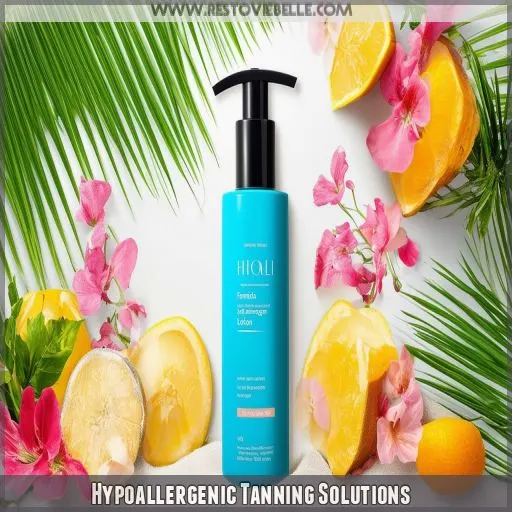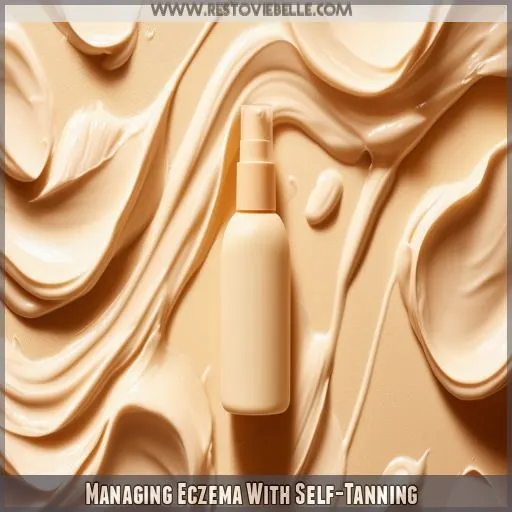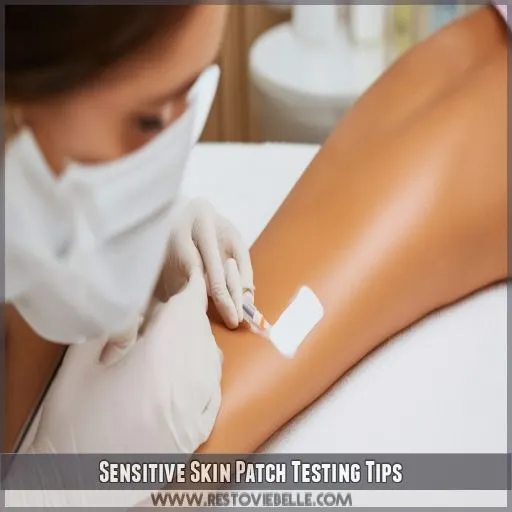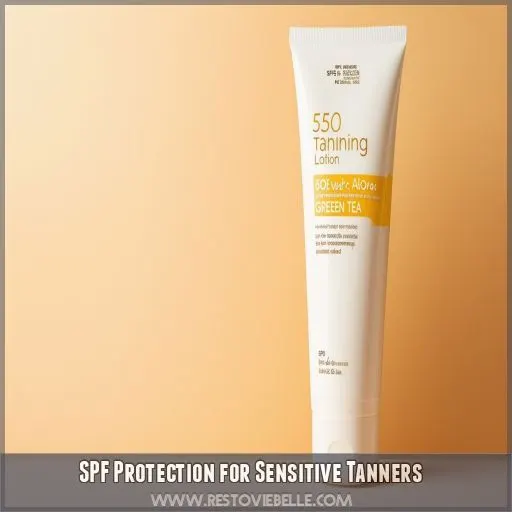This site is supported by our readers. We may earn a commission, at no cost to you, if you purchase through links.
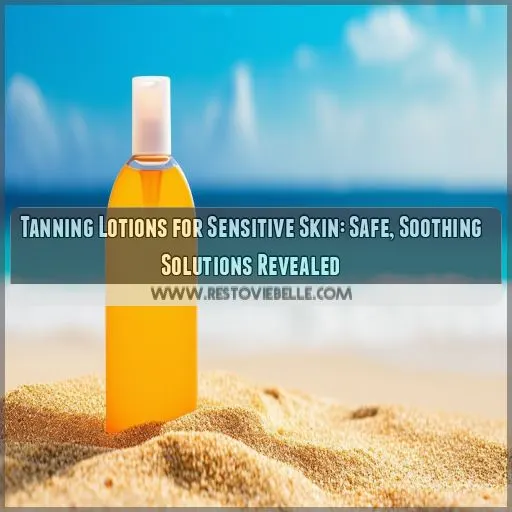
It is here where sensitive-skin-specific tanning lotions become the lighthouse in the storm, assuring you of a sun-kissed look sans irritation. These formulations are designed to pamper your delicate complexion by introducing gentle alternatives to harsh products.
We’re going to cover hypoallergenic options, eczema-friendly formulas, patch testing tips, and methods for SPF protection.
Discover how you can achieve that radiant tanned skin while soothing and protecting your sensitive skin.
Table Of Contents
- Key Takeaways
- Hypoallergenic Tanning Solutions
- Managing Eczema With Self-Tanning
- Sensitive Skin Patch Testing Tips
- SPF Protection for Sensitive Tanners
- Frequently Asked Questions (FAQs)
- What is the best way to tan with sensitive skin?
- Is there a hypoallergenic self-tanner?
- What’s the best fake tan for eczema?
- Why does self-tanner give me a rash?
- How long does a sensitive skin-friendly tan typically last?
- Can sensitive skin tanning lotions be used on face?
- Are there organic options for sensitive skin tanning products?
- How to remove tanning lotion if skin becomes irritated?
- Do sensitive skin tanning lotions have a different smell?
- Conclusion
Key Takeaways
- Talk about sun-kissed and stress-free! Hypoallergenic tanning lotions are your sensitive skin’s new BFF, letting you rock that golden glow without turning into a human lobster.
- Eczema sufferers, rejoice! There’s a whole world of gentle formulas out there, packed with soothing ingredients like aloe vera and chamomile. It’s like a spa day for your skin, with a bonus tan.
- Patch testing isn’t just for pirates looking for treasure. It’s your secret weapon against surprise skin reactions. A little dab’ll do ya – on your inner arm first, then face if all’s clear.
- SPF is the superhero cape your sensitive skin deserves. Don’t let those UV rays crash your tanning party – grab a hypoallergenic sunscreen and let your inner glow-getter shine!
Hypoallergenic Tanning Solutions
You’ll find hypoallergenic tanning lotions specifically formulated for sensitive skin, using gentle ingredients that minimize irritation. These products often exclude common allergens and irritants, allowing you to achieve a sun-kissed glow without compromising your skin’s comfort or health.
Gentle Formulations
You will be surprised how hypoallergenic tanning lotions are very gentle on your skin. These formulations are devised so as to give you a sun-kissed glow without an irritated skin. What makes these special creams unique is:
- Non-irritating ingredients
- Fragrance-free ones
- Dermatologist-approved formulations
These lotions, with their low-level tanning actives, gradually build your tan while taking care of the delicate skin. You can feel confident knowing you’re using a product that suits your needs while offering both safety and beautiful results.
Sensitive Skin Compatibility
Where the previous section introduced the more gentle formulations, discover how these are compatible with sensitive skin types.
You’ll come across fragrance-free, sulfate-free, and dye-free variations catering to your tender complexion. Many of them now combine botanical bronzers and eco-friendly packaging for you to try.
Designed to reduce irritation, these tanning lotions allow you to confidently create a sun-kissed look without causing discomfort to your skin.
Managing Eczema With Self-Tanning
If you’re managing eczema, look for self-tanning lotions with skin-soothing additives like aloe vera, chamomile, or oatmeal extract. These ingredients can help calm irritated skin while providing a natural-looking tan, but always opt for eczema-safe formulas that are free from common irritants like fragrances and harsh chemicals.
Skin Soothing Additives
Moving beyond hypoallergenic formulas, let’s go into skin-soothing additives that can make self-tanning a breeze for sensitive skin.
Hyaluronic acid, vitamin C, and vitamin E are ingredients one finds in gentle formulas designed for maximizing skin compatibility. These powerhouses not only help retain moisture and hydrate the skin but also provide other benefits.
Keep an eye out for products that pair the tanning agents with SPF.
Eczema-Safe Formulas
Looking for eczema-safe formulas in self-tanning is very important.
Watch out for products that contain calming agents like aloe vera or chamomile. These soothing ingredients help reduce irritation as they make you glow.
Opt for hypoallergenic alternatives and sensitive skin tan extenders.
Always test new products on a small patch of skin to see if it’s compatible with your special skin needs.
You can balance out eczema and achieve the beautiful tan you want with the right formula.
Sensitive Skin Patch Testing Tips
To prevent allergic reactions to tanning lotions, you’ll need to perform a patch test before full application. Apply a small amount of the product to a discreet area of skin, such as the inner arm or behind the ear, and wait 24 hours to check for any adverse reactions.
Allergic Reaction Prevention
Patch testing is very essential in making sure that sensitive skin doesn’t react to allergic reactions. Always try new tanning lotions on your inner arm before using them.
Then, wait 24 hours; if immediate skin irritation, rashing, or redness shows up, it may be a signal. That way, you’ll be safe from discomfort.
Many vegan and reef-friendly products are pretty gentle on the skin and won’t cause as many reactions.
Testing Methods
To patch test your tanning lotion, start by applying a small amount to your inner forearm. Wait 24 hours to check for any reactions.
If you’re in the clear, test it on a small facial area next. Remember, different body parts may react differently.
Always read product ingredients carefully and follow application techniques precisely.
Safety precautions are key when using products like Bondi Sands Pure Gradual Tanning Lotion or facial SPF.
SPF Protection for Sensitive Tanners
Whenever using tanning lotions for sensitive skin, make sure you protect your skin from the sun’s harmful UVs. Look for hypoallergenic sunscreens that offer broad-spectrum protection and are specifically designed for sensitive skin to reduce irritation while maintaining sun safety.
Sun Safety Measures
Now that patch testing is finally behind you, it’s time to get serious about sun safety. As much as incremental tanning will help you go easy on your skin, it’s not exactly bulletproof.
Infuse some vitamin C-based sun creams into your regime to keep those unwelcome eczema flare-ups at bay and your complexion on point. Delayed bronzers are also great for an authentic look without containing any bronzer ingredients at all.
Sun protection isn’t just a way to ensure you won’t get burned; it stops your skin from tightening prematurely with UV rays.
Hypoallergenic Sunscreens
Where sun protection is concerned, it’s an absolute must to have hypoallergenic sunscreen. These mild formulas will protect sensitive skin without irritation from the worst UVs. Look out for products that make sure they feature:
- Broad-spectrum protection
- Mineral-based ingredients: zinc oxide
• Fragrance-free formulations
- Recyclable packaging for sustainability
Frequently Asked Questions (FAQs)
What is the best way to tan with sensitive skin?
You’ll want to start slowly with a gradual self-tanner. Apply it evenly, and do a patch test first. Use hypoallergenic products designed for sensitive skin. Don’t forget sunscreen, and moisturize daily to maintain your glow.
Is there a hypoallergenic self-tanner?
Yes, hypoallergenic self-tanners are available. They’re designed for sensitive skin, free from common irritants like fragrances and dyes. You’ll want to patch test before use and look for products with gentle, nourishing ingredients to minimize potential reactions.
What’s the best fake tan for eczema?
Are you feeling trapped in your skin? For eczema-prone skin, opt for hypoallergenic, fragrance-free self-tanners with soothing ingredients like aloe vera. Look for products specifically formulated for sensitive skin, and always patch test before use. Gradual tanners can be gentler options.
Why does self-tanner give me a rash?
Self-tanner can cause a rash due to allergic reactions or skin sensitivity. Common culprits include fragrances, preservatives, or the active ingredient DHA. Your skin might also be reacting to the drying effects or pH changes from the product.
How long does a sensitive skin-friendly tan typically last?
Like a fleeting summer romance, your sensitive-skin tan’s longevity varies. You’ll typically enjoy 5-7 days of golden glow. Proper care, including moisturizing and gentle exfoliation, can extend your sun-kissed look. Reapply as needed for continuous radiance.
Can sensitive skin tanning lotions be used on face?
Yes, you can use sensitive skin tanning lotions on your face. As named, they’re especially formulated not to be as bothersome to the skin. However, testing it on a small patch of skin would still be wiser, and seek out those special products designated for facial applications to have the best outcome.
Are there organic options for sensitive skin tanning products?
Did you know 60% of consumers prefer organic skincare? You’ll find organic options for sensitive skin tanning. Look for products with natural ingredients like aloe vera, coconut oil, and chamomile. They’re gentler and often more eco-friendly.
How to remove tanning lotion if skin becomes irritated?
If your skin becomes irritated, gently cleanse the affected area with mild soap and warm water. Pat dry, then apply a soothing, fragrance-free moisturizer. Discontinue lotion use and consult a dermatologist if irritation persists or worsens.
Do sensitive skin tanning lotions have a different smell?
Imagine a gentle breeze caressing your skin. Most sensitive skin tanning lotions are fragrance-free, eliminating strong scents. You’ll notice a subtle, neutral aroma or no smell at all, ensuring comfort for your delicate skin while achieving that sun-kissed glow.
Conclusion
As the saying goes, "Beauty is only skin deep." But with the right tanning lotions for sensitive skin, you can achieve a sun-kissed glow while keeping your delicate complexion happy.
By exploring hypoallergenic options, eczema-friendly formulas, and proper patch testing techniques, you’ll find safe solutions for your tanning needs.
Don’t forget to prioritize SPF protection to shield your skin from harmful rays.
With these tips, you can confidently embrace a golden tan without compromising your skin’s health.

